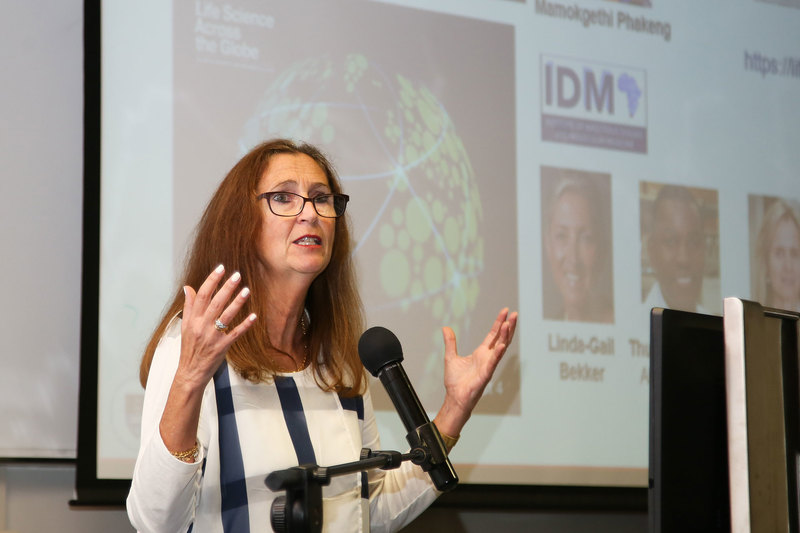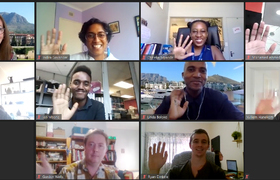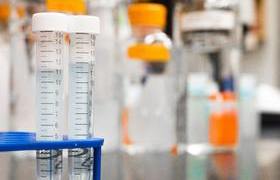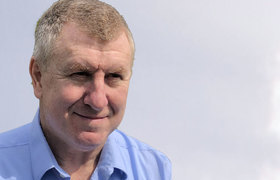Teamwork is the key to success for the IDM
26 November 2021 | Story Wendyl Martin. Photo Je’nine May. Read time 7 min.
Teamwork is key for Professor Valerie Mizrahi, the director of the Institute of Infectious Disease and Molecular Medicine (IDM) at the University of Cape Town (UCT). However, TEAM goes a little further for her and the institute she leads; it is a combination of things that holds them accountable to the research they facilitate and conduct, and the stakeholders who enable it.
TEAM is an acronym for Transformation, Education, Advocacy and Mentorship. Professor Mizrahi explained the concept during her delivery of the Wolfson Memorial Lecture on 22 November 2021.
UCT Vice-Chancellor Professor Mamokgethi Phakeng said that the lecture was established in 2012 to honour the many generous contributions to UCT by the late Lord Wolfson of Marylebone and the Wolfson Foundation.
“This event takes place physically here in the Wolfson Pavilion, now home to the IDM on our [health sciences] campus. This gathering honours the strong partnership between UCT and the Wolfson Foundation [and] our shared commitment to the pursuit of excellence in education and research,” said Professor Phakeng.
Inequality drives the need for research
Phakeng acknowledged the work of Mizrahi and the institution in HIV and TB research, and highlighted their ability to rise to the more recent needs of COVID-19 research.
“The COVID-19 virus presents particular challenges on the African continent, where unequal access to healthcare serves to deepen poverty and inequality.
“I’ve spoken about the tension that is created when we aspire to be a world-class university in a society that remains profoundly unequal, and we have to continue managing the tension between responding to the local imperatives while we continue to be a globally impactful institution.
“We give thanks for a woman like Professor Mizrahi, whose contribution will stand for generations to come and whose star has shone across the globe.”
“However, the work of Professor Mizrahi and her colleagues and students in the IDM demonstrates convincingly that we can overcome this tension through excellence in research that responds to a significant local challenge, while contributing to a body of knowledge with relevance internationally.”
Dean of the Faculty of Health Sciences Associate Professor Lionel Green-Thompson said the lecture gives them the opportunity to celebrate the spirit of an individual whose story tells of a “formidable tenacity”.
“We give thanks for a woman like Professor Mizrahi, whose contribution will stand for generations to come and whose star has shone across the globe, bringing honour to this house and to its people,” he said.
The institution is a team
In her vision of ‘team’, Mizrahi said the IDM is a place where scientists work together to tackle diseases of importance in Africa.
“We work at the intersection of the lab, the clinic and the community. Our mission has four elements: to do research, to use research as a vehicle to develop people, to translate our research into policy and practice, and to work together with others in partnership; and our values mirror those of the university and the faculties to which we belong: Health Sciences and the Science faculty,” said Mizrahi.
The diseases they work on are currently categorised into five interlinked themes: TB, HIV/AIDS, COVID-19, other infectious diseases and non-communicable diseases.
“We are a large, postgraduate, cross-faculty research institute at UCT – we draw our members from Health Sciences and the Faculty of Science, from nine academic departments; and the centrepiece of the institute is the 46 full and associate members who do all of the research under the institute and run their own research groups.”
“I have recognised and trust implicitly the brilliance of the people I am privileged to work with.”
The four elements of TEAM drive them closer to community engagement, or social responsiveness as it is often known at UCT. Several community projects have stemmed from work started or enabled by the institute. Mizrahi named the youth videography project, Eh!Woza; Wishing for Wellness, which empowers young women in Masiphumelele with knowledge about sexually transmitted infections; and the Tutu Tester from the Desmond Tutu Health Foundation, which takes health services into the communities.
“I have recognised and trust implicitly the brilliance of the people I am privileged to work with here. Instead of telling people what to do, we have taken our lead from the great scientists here who know how to move their science in the directions that it needs to move; and my job and that of the executive has been to support them in every possible way. We pay close attention to the enablers here: our clinical research workers in Khayelitsha or Masiphumelele, the technicians in the laboratories, the administrators, our finance and our HR staff.”
Challenges
In reflecting on her 10 years, Mizrahi recognises that there were challenges for the team and that there may be more to come.
“We’re in a university that is organised along faculties and departments. The power sits with heads of departments, not with institute directors. When you are cross-cutting faculties and departments, you will encounter barriers; and when you are as fast moving as we try to be, we encounter barriers. We sit in an environment where the university has helped us and heard us on this.
“The recognition of the gross inequities in global health brought to the fore by the pandemic is driving a rethink of what partnerships mean in global health research. Being strong gives us the huge responsibility of ensuring the principles of equity, equality [and] fairness, of mutual benefit and joint ownership.”
The in-person event included a brief tour of the renovated Wolfson Pavilion building.
“We have doubled in 10 years, and we have run out of space. This is my opportunity to publically acknowledge Jonathan Blackburn, our deputy director. This project is his brainchild. We will have 1 500 m² of new space. This will accommodate an advanced imaging centre, a mass spectrometry facility, a data analysis centre, and shared spaces in which people can work together and feed off each other,” said Mizrahi.
The new facilities, together with the team at IDM, will enable them to blaze a new path in the way research happens.
“There has been a great acceleration in the ‘shift in the centre of gravity’ of thinking [in] the Global South. It is a tsunami that [the] pandemic has accelerated. This signals an increasingly important role for strong research institutes and centres of excellence, such as the IDM, over the next decade and beyond. We need to be ready to assume our role of leadership.”
 This work is licensed under a Creative Commons Attribution-NoDerivatives 4.0 International License.
This work is licensed under a Creative Commons Attribution-NoDerivatives 4.0 International License.
Please view the republishing articles page for more information.










